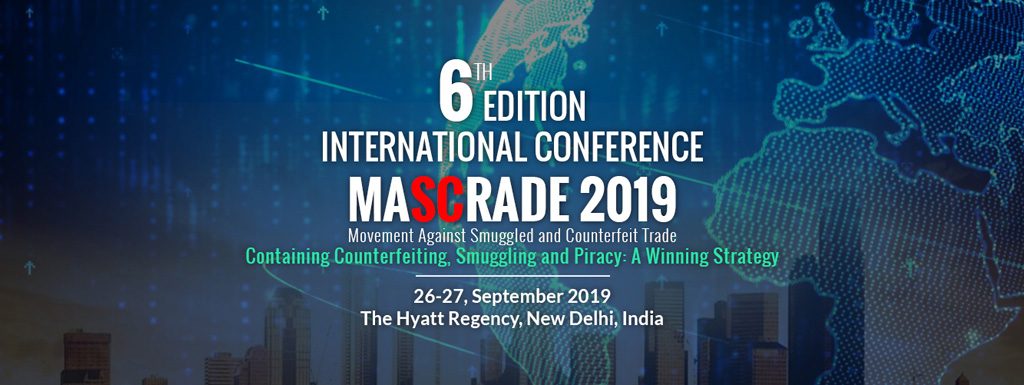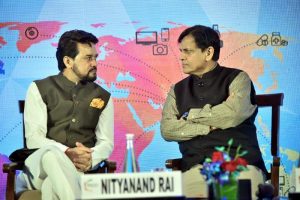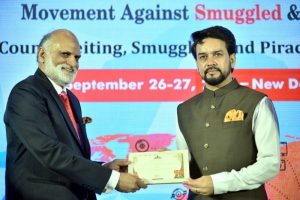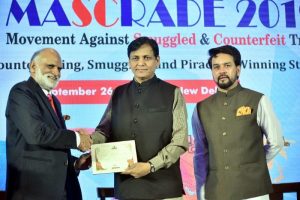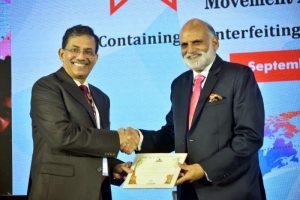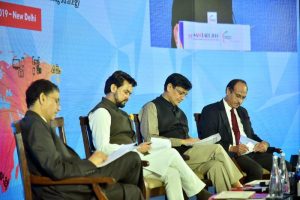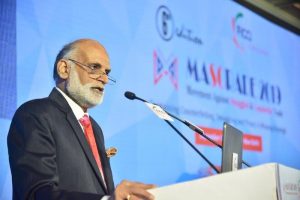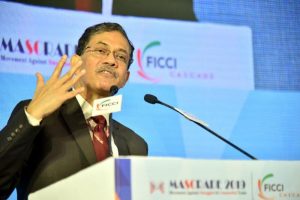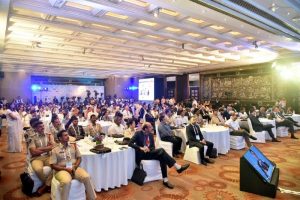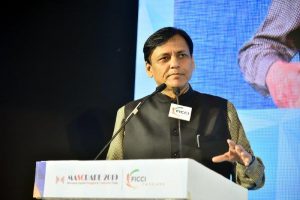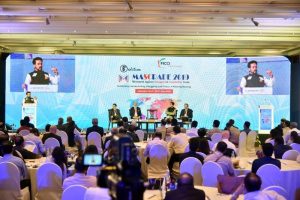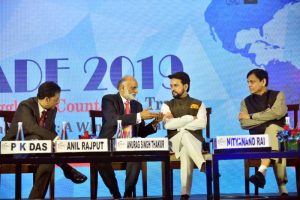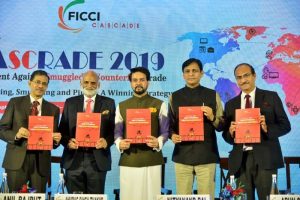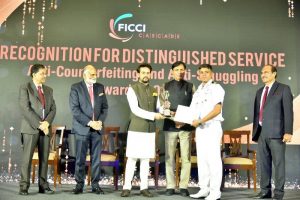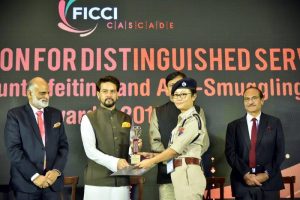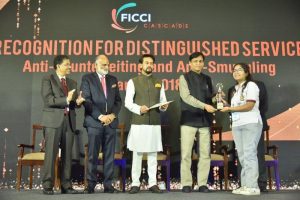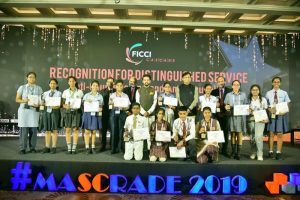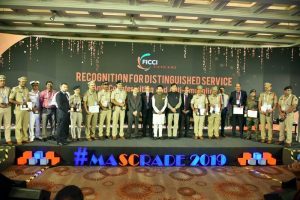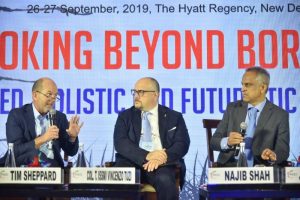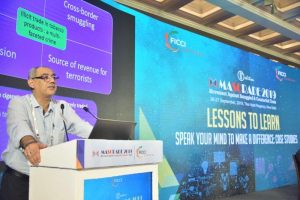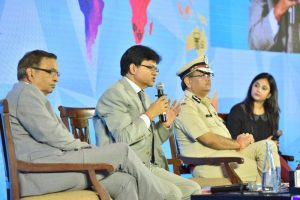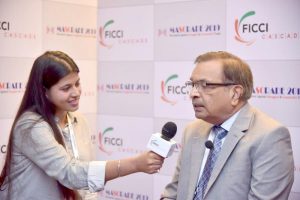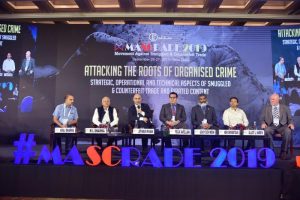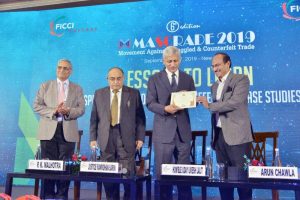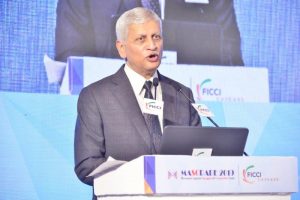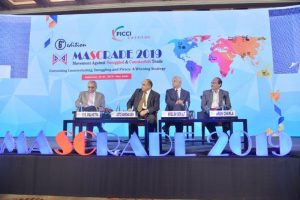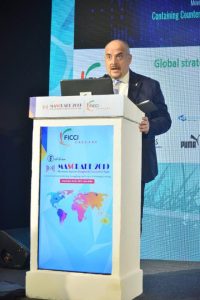26-27 September, 2019
The Hyatt Regency, New Delhi, India
Containing Counterfeiting, Smuggling and Piracy: A Winning Strategy
It has long been known that illicit trade in terms of counterfeiting, smuggling and piracy make up a vast ‘global businesses’, representing a multibillion-dollar illegal industry that creates a significant drain on the world economy. Further, it negatively impacts legitimate economic activity and facilitates an underground economy and organized crime that deprives governments of revenues for vital public services, forces higher burdens on taxpayers, dislocates hundreds of thousands of legitimate jobs and exposes consumers to dangerous and ineffective products.
It is this area in which CASCADE (Committee Against Smuggling and Counterfeiting Activities Destroying the Economy), of FICCI, with a view to bring about a change, has been pursuing a campaign to raise consumer awareness, policy makers in the government, and the concerned enforcement agencies.
As a significant part of this campaign, every year, CASCADE holds its flagship international event, namely, MASCRADE (Movement Against Smuggled and Counterfeit Trade), which is attended by many delegates from India and abroad. The sixth edition of this movement was held in New Delhi during 26-27 September this year with a theme of ’Containing Counterfeiting, Smuggling and Piracy: A Winning Strategy’. MASCRADE2019 focused on decisive intervention as a way of addressing the debilitating impact of counterfeiting and smuggling on global economies. This conference was a conscious and well directed attempt to bring in the best minds from the fields of policy making, law, brand protection, industry, enforcement agencies and media to find a holistic and permanent solution to the problem of counterfeiting, smuggling and piracy, which if left unchecked, threatens to subvert the economic and societal stability of countries across the world.
Shri Anurag Singh Thakur, Hon’ble Minister of State, Finance and Corporate Affairs, Government of India inaugurating the conference said that the Government along with organizations like FICCI must fight against counterfeit, illegal smuggling and piracy. He further stated that India needs more awareness to understand the difference between fake and original goods and urged to leverage use of technology to stop this growing menace.
In our country any illegal activity is not appreciated and I am sure that we will soon overcome this problem which triggers criminal activity stated Shri Nityanand Rai, Hon’ble Minister of State, Home Affairs, Government of India. Addressing the gathering, Hon’ble Minister said that counterfeiting and smuggling directly impacts health, economy, education and society. We should come together and say no to counterfeit and smuggled products. The government of India has already taken several measures to address this issue and FICCI CASCADE should send recommendations on curbing this problem to all ministries in the government to further strengthen these measures.
In a special address, Mr. P. K Das, Chairman, Central Board of Indirect Taxes and Customs, highlighted the several initiatives undertaken by the Government of India to fight the menace of smuggling and counterfeiting. He said that “money generated through illicit trade funds organized crime and nurtures illegal drugs trade, he further added that “CBIC India is equipped with all advance technological wherewithal to detect counterfeit and smuggled products.”
Mr. Anil Rajput, Chairman, FICCI CASCADE in his welcome address emphasised, “I must say that the work undertaken by Shri Narendra Modi ji’s government has been laudable. Under his able directions and guidance, the seizures of illicit goods are at an all-time high in India. Smuggling and counterfeiting are increasingly hurting Indian economy and have crept into multiple sections of the society. Immediate steps are required, both in the form of policy intervention and awareness generation, to address this growing menace”.
The event saw the release of a study commissioned by FICCI CASCADE to Thought Arbitrage Research Institute (TARI)—’Invisible Enemy: Impact of Smuggling on Indian Economy and Employment’. The study is a pioneering effort in India, which quantitatively estimates both revenue and livelihood opportunity lost due to smuggling in five specific industries. These are: Textiles, Tobacco Products (Cigarettes), Readymade Garments, Capital Goods (Machinery and Parts) and Consumer (Electronics) Durables. The report also highlights the key challenges posed by smuggling and suggests possible solutions to make compliance and related processes more robust with the overarching objective of arresting the spread of smuggling.
To encourage and acknowledge the work of our law enforcement agencies, FICCI CASCADE also felicitated the best performing officers for the year 2018-19, for their outstanding achievement in the prevention of counterfeiting & smuggling, and enforcement of anti-smuggling & anti-counterfeiting laws on this occasion.
Key deliberations and Recommendations – MASCRADE2019
Various issues such as Balanced, Holistic and Futuristic Strategies; Balancing Brand Security Strategies and Actionable on Ground Operations; Attacking the roots of organized crime; Policy and Regulatory framework needed to Stop Counterfeiting, Smuggling & Piracy from Entering the Virtual Marketplace among others were deliberated in the two-day dialogue which was attended by over 600 delegates.
Along with growth in economy, there has also been rise in illicit trade. In fact, rate of growth of illicit trade has outpaced the growth in economy. It has credibly been estimated that by 2022, the market size of this illegal business at global level will touch US$ 3 trillion. No country is immune to this problem, and there is no product, the counterfeit of which is not available in the market.
A report by USTR informs us that pharmaceuticals and FMCG products are facing a big problem due to illicit markets. 20% of pharmaceuticals sold in the market are either counterfeit or sub-standard, and in the case of FMCG products, 7-10% of the market share has been taken away by smuggled or counterfeit goods which results in a loss of Rs. 21,000 to Rs. 31,000 crore to the legal industry. One alarming aspect of the illegal business is that money generated through this is the main source of financing of terrorism across the globe. Different terrorist organizations indulge in smuggling and counterfeiting of specified products viz Islamic State in cigarettes and mobile phones; Hezbollah in drugs and medicines; Al Qaeda in clothing and bags; Irish Republican Army in pirated discs and clothing; Hamas in drugs and food products; and Boko Haram in cigarettes. Rightly so, this evil business is termed as the crime of the 21st century by the FBI.
Speakers in the conference also mentioned about the online sale of counterfeit goods. Nearly one in three Indians have reported receiving counterfeit products online. An OECD report of March 2019 shows that worldwide percentage of counterfeit footwear is about 22%, clothing 16%, leather goods 13%, electric equipments 12%, etc. It is important to note that since brands stand for social status, trust, quality, originality etc., hence any activity that compromises with this has to be curbed effectively.
It was suggested that vigorous consumer awareness campaigns are required to be undertaken at a large scale. Further, multimedia campaigns such as government’s “Jago Grahak Jago” are also needed to be launched on a much bigger scale. This will empower the consumers to differentiate between the genuine and fake. Industry has also to take steps to safeguard the integrity of supply chains of their products, check notorious markets regularly, and use technology to track and trace movement of their original products in transit. Industry has to put thrust on risk assessment and make more investment in intelligence services. To check this menace, whole-hearted support of the government is necessary. The government has to establish a nodal vigilance agency to carry out regular monitoring of illegal activities.
A regular and constant dialogue with international stakeholders will also help in disseminating global best practices. It was suggested that legal provisions dealing with such crimes are needed to be reinforced. The extant bail provisions are not severe, and that after detection of a case and completion of investigation, only a few prosecution proceedings result in conviction. It is necessary that bail should carry high amount of security, there should be stringent monetary penalty for the offences, and imprisonment should be more rigorous than at present. It was also opined that certainty about infliction of penalty is more effective than severity of the penal action. Investigation and prosecution must end in a specified period. The need for separate commercial courts manned by specially trained judges was also recommended. Dynamic injunctions coupled with punitive damages and making the provision of arbitration applicable for such offences were discussed. There is a need for a comprehensive national legislation to deal effectively with organized crime like the one in Maharashtra.
Hon’ble Shri Uday Umesh Lalit, Judge, Supreme Court of India in his valedictory address said that counterfeiting is like a cancerous cell eating into the body of the society. There must be body to conduct constant and vigilant monitoring to curb counterfeiting before it takes place. It is imperative that the judicial process, executive vigilance and legislative apparatus must work together to stop the menace of counterfeiting and smuggling.
A systematic treatment and persuasion by global community for stronger enforcement is needed to address this issue. The conference saw a host of notable international speakers from INTERPOL, US Intellectual Property-South Asia, UK Intellectual Property Office, Australian Border Force, HM Revenue and Customs and US Dept. of Homeland Security, and captains from the industry across sectors. Notable senior Indian government officials from Ministry of Home Affairs, GoI, Department of Law and Justice, Central Board of Indirect taxes and Customs, Directorate of Revenue Intelligence, Delhi Police, Customs also took part in the deliberations and extended their support to this initiative.
Since, the Indian economy has planned to reach the target of US$ 5 trillion by 2024, illicit trade having a serious decelerating effect on growth, has to be curbed substantially. This will happen only if concerted effort is made by all stakeholders. All concerned have to cooperate to ensure that an effective and workable deterrence to contain the spread of this menace, is created without any loss of time. In absence of such an action, it would be difficult to arrest this menace.
Coverage reportDownload Pdf





